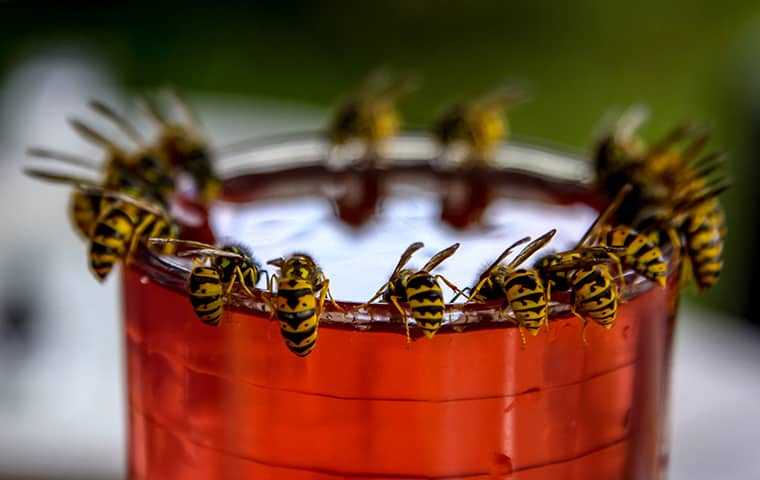
Stinging Insect Identification & Prevention
What You Need To Know About Stinging Insects
Stinging insects in Knoxville, like hornets, wasps, and yellow jackets, regularly call our properties home. Learning about insects that sting is the best way to keep them away from your yard and home.
When it comes to stinging insects, it is essential to be proactive to keep them from becoming a danger to you, your family, and your pets. We have created our stinging insect guide to teach you about the ins and outs of stinging insects.

Frequently Asked Questions
-
How can I prevent stinging insects in the future?
Keeping outdoor pests like stinging insects away from your Knoxville property is frustrating. Use the following five prevention tips to make your property less interesting to them.
Trim tree branches and other foliage away from the outside of your home.
Remove potential nesting sites like fallen trees, brush piles, and tree stumps from your property.
Wasps and other stinging insects love to forage from trash cans. Keep lids on as recycling and trash bins.
Avoid planting flowers near your home's entrances.
Eliminate areas of standing water in your yard that offer a water source.
For quality home pest control to keep stinging insects at bay, Southeast Termite & Pest Control is here to help!
-
How do I get rid of stinging insects?If stinging insects in Tennessee are taking over your property, never try to get rid of them on your own; always reach out to a knowledgeable professional. At Southeast Termite and Pest Control, our pest management professionals have the skill, patience, and knowledge necessary to safely remove stinging insects and their nests from Knoxville properties. Learn more about our year-round pest control services in Knoxville by calling us today to prevent problems with stinging insects and our area's other common pests!
-
Where will I find stinging insects?
During the summer and early fall seasons, you will find stinging insects swarming outdoor spaces and ruining outdoor activities like swimming parties and barbecues.
Our yards offer stinging insects plenty of places to forage food for themselves and to bring back to their nests. Gardens, flower beds, trash cans, compost areas, flowering trees, and outdoor eating and cooking areas are where people have the most contact with these pests.
Stinging insects nest in various places depending on their species, all choosing a nesting site that offers them shelter from harsh weather and predators. Some of the most common areas we discover stinging insect nests include the following:
Tree hollows and tree branches
Inside dense shrubs or other landscaping plants
Ground holes
Rock piles or brush piles
Under roof eaves or decks
In the corners of windows or doors
Inside garages, sheds, or attics
If you have found a stinging insect nest on your property or know one is present that you can't locate, quickly get in touch with a pest control professional for assistance.
-
Why do I have a stinging insect problem?In most cases, leaving stinging insects alone is best practice, except when they decide to live in our yards or homes. When stinging insects target your property as a place to nest and forage for food, it will put you and your family in direct contact with these pests on a daily basis. If your property offers stinging insects with what they need and want, they won't hesitate to take advantage, and they won't be easy to deter.
-
Are stinging insects dangerous?
Stinging insects are a danger to adults, children, and pets. A stinging insect uses the stinger at the end of its abdomen to inject venom into people and animals. When stinging insects nest in your yard, their presence can make you feel on edge. Stinging insects can easily ruin everyday things like cooking outside, taking out the trash, and gardening.
Stinging insect venom is potent enough to trigger allergic reactions ranging from mild to life-threatening. Hornets, wasps, and yellow jackets can sting multiple times, and with each sting, you will experience more pain, and they will inject more venom into your body.
-
What are stinging insects?
We typically describe stinging insects as solitary or social. Solitary species of stinging insects have females that create individual nests, and they are usually relatively docile and aren't quick to sting. Stinging insects that are social live together in large groups inside a single nest. They are generally faster to sting and often attack as a group.
Stinging insect identification is best made by a professional. Various species of stinging insects can make their way to our properties. Most are fast-moving, and it's never a good idea to get up and personal to determine the exact species on your property.
Though it is important to try to live in harmony with stinging insects because of their eco-importance, protecting ourselves and our families from their dangers is also important. Stinging insects are beneficial out in nature but unwanted pests in our yards.

Why Choose Southeast Termite & Pest Control?
-
Unmatched ExperienceSoutheast Termite & Pest Control has been solving pest problems since 1971. With over 50 years of experience in pest control, we know how to do the job right the first time.
-
Pest Specialist ExpertiseOur employees are all pest specialists who are highly trained and experienced. With most having worked with us for years, you can be certain to receive the service you need for a pest-free home or business.
-
Efficient ServiceWhen pests invade your property, you don’t want pest control that takes forever to work. We can be at your home or business within a day to provide the efficient pest control you need to get rid of your pest problems.
Recent Blogs
-
 All The Problems Rats Bring To Knoxville HomesRead More
All The Problems Rats Bring To Knoxville HomesRead More -
 Mouse-Proofing Your Knoxville Home: The Best Strategy For Effective ControlRead More
Mouse-Proofing Your Knoxville Home: The Best Strategy For Effective ControlRead More -
 Crawl Space Encapsulation: Your Complete Solution For A Dry And Healthy Knoxville HomeRead More
Crawl Space Encapsulation: Your Complete Solution For A Dry And Healthy Knoxville HomeRead More -
 How To Get Rid Of Cockroaches: A Comprehensive Guide For Knoxville HomeownersRead More
How To Get Rid Of Cockroaches: A Comprehensive Guide For Knoxville HomeownersRead More -
 Fall Pest Outlook For Knoxville HomeownersRead More
Fall Pest Outlook For Knoxville HomeownersRead More -
 How To Keep Dangerous Mosquitoes Away From Your Knoxville HomeRead More
How To Keep Dangerous Mosquitoes Away From Your Knoxville HomeRead More -
 Spiders Be Gone: A Guide To Keeping Spiders Out Of Your Home In KnoxvilleRead More
Spiders Be Gone: A Guide To Keeping Spiders Out Of Your Home In KnoxvilleRead More -
 Why Knoxville Homeowners Should Beware Of Bed BugsRead More
Why Knoxville Homeowners Should Beware Of Bed BugsRead More












